Books
Profit in Potato-Digging
Undated. I'm guessing it's late 19th Century. From OddBook.ca:Maybe I should give up this blogging gig and start digging potatoes!


Posted By: Alex - Thu Apr 01, 2021 -
Comments (2)
Category: Self-help Schemes, Books, Vegetables, Nineteenth Century
The Wicked Bible
An edition of the Bible printed in 1631 came to be known as the 'Wicked Bible' because it omitted one, important word — the word 'not' from the seventh commandment. This made the commandment read, 'Thou shalt commit adultery'. More details from The Guardian:
There's still debate about whether the omission was accidental, purposeful, or sabotage.
Only ten copies of the Wicked Bible are known to exist today. The current going price for one is around $100,000.
More info: wikipedia
Posted By: Alex - Sat Mar 13, 2021 -
Comments (10)
Category: Religion, Books, Seventeenth Century
Getaway
Getaway, by Ronald George Eriksen 2 (is the '2' an alternative form of Jr.?), offers instruction on evasive driving techniques. Or, as he says, how to handle a car in the event that someone tries to kill or kidnap you while you're in the car. It was published by Loompanics in 1983, but you can read it for free at archive.org.
In it, you'll find tips such as how to make a smoke screen blow out of your exhaust:
Also, how to do a bootlegger's turn:
(2) Get off the gas and crank the steering wheel to the left ¼ to ½ of a full turn. At the exact same time, hit the emergency brake hard. Those of you with manual transmissions will have to depress the clutch, also.
(3) When your vehicle is at approximately 90 degrees, release the emergency brake, step on the gas, and straighten out the steering wheel. If you have a manual transmission, you will have to let the clutch back out as you are hitting the gas.
(4) Get out of the area fast.

Bootlegger's Turn
Posted By: Alex - Wed Feb 24, 2021 -
Comments (5)
Category: Motor Vehicles, Cars, Books
Avakoum Zahov, the Soviet James Bond
Avakoum Zahov was a fictional secret agent who featured in the novels of the Bulgarian writer Andrei Gulyashki. Zahov made his first appearance in the 1959 novel The Zakhov Mission. He returned in the 1966 novel Avakoum Zahov versus 07 — in which he battles and defeats a British agent known as '07'.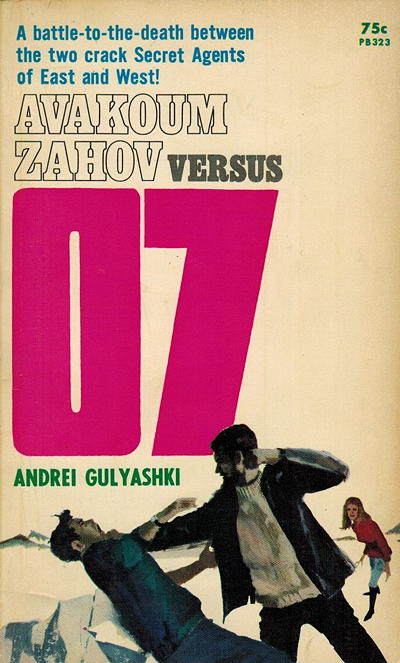
image source: pulp curry
There have been persistent rumors that Gulyashki created Zahov at the behest of the KGB in an attempt to produce a Soviet James Bond. Details from an article by Andrew Nette:
It is not clear where McCormick got his information, but others have since picked up the claim and run with it. The Penguin Dictionary of Literary Terms and Literary Theory states that Gulyashki ‘was invited by the KGB to refurbish the image of Soviet espionage which had been tarnished by the success of James Bond’. Likewise, Wesley Britton claims in Beyond Bond: Spies in Fiction and Film that, in 1966, the Bulgarian novelist was hired by the Soviet press to create a communist agent to stand against the British spy ‘because of Russian fears that 007 was in fact an effective propaganda tool for the West’.
"My name is Zahov, Avakoum Zahov" just doesn't have the same ring as "Bond, James Bond".
Posted By: Alex - Sat Feb 06, 2021 -
Comments (4)
Category: Literature, Books, Spies and Intelligence Services, 1960s
Essay on Silence
Essay on Silence, authored by Fra Elbertus (pen name of Elbert Hubbard) was published by the Roycroft Press in 1905. It consisted of 40 blank pages, bound in leather with a spine printed in gilt. As such it belongs to the genre of empty books.
image source: Specific Object
Wikipedia notes that most empty books are published as political satires. For example, one of the earliest examples of the genre was The Political Achievements of the Earl of Dalkeith, consisting of 32 bound, blank pages. Hubbard's book seems to be the earliest, non-political example of the genre.
A 1905 first edition of the Essay on Silence will cost you $125. But there were various reprints published over the years, which are cheaper. Some of the reprints included a four-page, blank text insert titled, "The Essay on Silence Revised Edition with Corrections and Emendations to Date."
Incidentally, Elbert Hubbard is rumored to be the uncle of L. Ron Hubbard, founder of Scientology. At least, L. Ron Hubbard claimed this to be so. But Elbert Hubbard's followers disagree, arguing that "L. Ron Hubbard was known to elaborate on his background, and it is said he used the popularity of Elbert’s name to promote his own causes."
Posted By: Alex - Mon Jan 25, 2021 -
Comments (0)
Category: Books, 1900s
Fore-Edge Painted Books
An article with examples here.
Posted By: Paul - Thu Jan 07, 2021 -
Comments (2)
Category: Art, Magic and Illusions and Sleight of Hand, Books
Phone Calls From the Dead
As opposed to phone calls from telemarketers, who are more like the living dead.— The Skeptical Inquirer - Summer 1979


Posted By: Alex - Wed Dec 23, 2020 -
Comments (4)
Category: Death, Paranormal, Books, 1970s
TLALAATALA
Jose Luis Castillejo (1930-2014) described himself as a "modern writer". In 1969 he self-published The Book of I's, which was a book that consisted entirely of the letter 'i', printed repeatedly on several hundred pages. He said that he wrote it to "end the torrent of words we call literature." It's read below by Fernando Millan. (He begins reading the book shortly after the 1-minute mark).In 2001, Castillejo explored the letters T, L, and A, with his release of TLALAATALA. It's read again by Millan.
As you might guess, writing wasn't Castillejo's day job. He earned his living as a diplomat, serving as General Consul of Spain in Stuttgart, as well as Spanish ambassador to Nigeria and Benin.
More info about Castillejo: caac.es
Posted By: Alex - Fri Dec 11, 2020 -
Comments (3)
Category: Literature, Books
Dog chews ‘How to train your dog’
While browsing old newspapers, I've come across multiple reports of a book titled How to Train Your Dog being returned to libraries, chewed.These reports span thirty years, and specify different locations where this happened, but the stories are otherwise identical. So I figure that the chewed dog training book must be an urban legend of libraries.
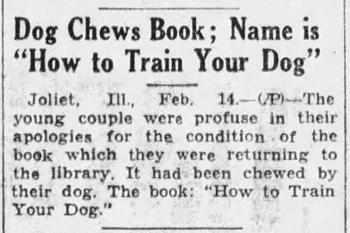
Wausau Daily Herald - Feb 14, 1940
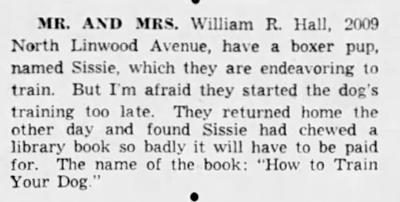
Indianapolis Star - May 24, 1951

Chattanooga Daily Times - Apr 25, 1955
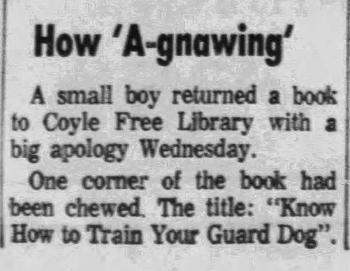
Chambersburg Public Opinion - Mar 13, 1969
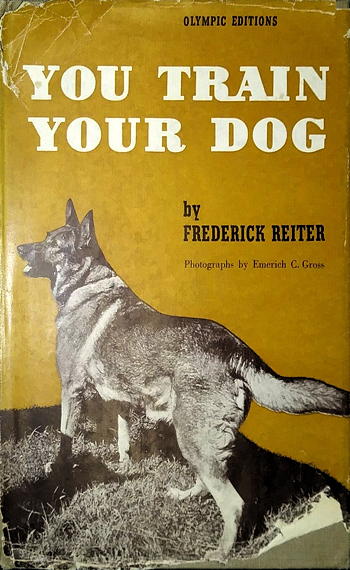
Posted By: Alex - Tue Dec 01, 2020 -
Comments (0)
Category: Books, Libraries, Myths and Fairytales, Dogs
The Trance
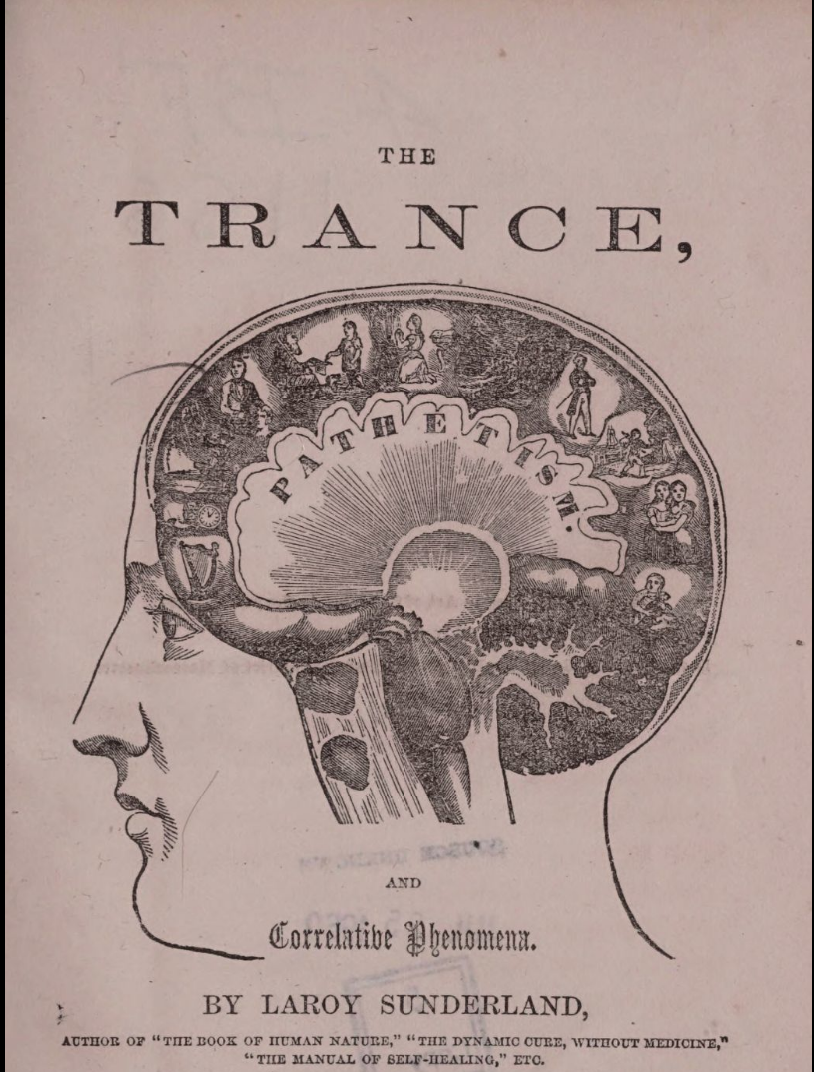
Everything you need to know about religious trances.
Posted By: Paul - Fri Nov 13, 2020 -
Comments (0)
Category: Religion, Science, Supernatural, Occult, Paranormal, Books, Nineteenth Century

| Who We Are |
|---|
| Alex Boese Alex is the creator and curator of the Museum of Hoaxes. He's also the author of various weird, non-fiction, science-themed books such as Elephants on Acid and Psychedelic Apes. Paul Di Filippo Paul has been paid to put weird ideas into fictional form for over thirty years, in his career as a noted science fiction writer. He has recently begun blogging on many curious topics with three fellow writers at The Inferior 4+1. Contact Us |




